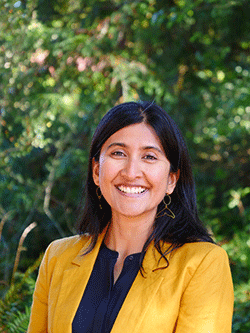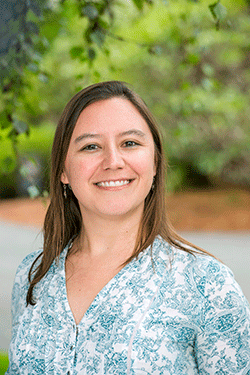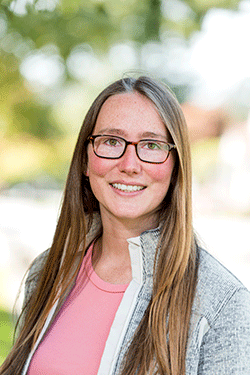The Humboldt State University Sponsored Programs Foundation has announced the 2021 winners of the McCrone Promising Faculty Scholars Award. Selected for progress and potential in their field, the recognition comes with a $1,500 award for each faculty member. In addition, the Alistair and Judith McCrone Graduate Fellowship awards $3,000 to one HSU graduate student to support their research. The funding is made possible in honor of former HSU President Alistair McCrone and his wife, Judith, who together shepherded HSU and its students for over a quarter of a century.
The 2021 McCrone recipients are Environmental Studies Professor Deepti Chatti, Biology Professor Catalina Cuellar-Gempeler, Chemistry Professor Claire Till, and Environmental Science & Management graduate student Sean Stewart.
Each will be honored at a April 29 virtual reception hosted by HSU’s Sponsored Programs Foundation.

Environmental Studies Professor Deepti Chatti brings a unique set of interdisciplinary research skills to HSU. As a critical social scientist of energy and the environment, Chatti conducts ethnographic research in India and the United States. An affiliate faculty member in HSU’s Environment & Community and Energy, Technology, & Policy graduate programs, Chatti is also a faculty research associate at the Schatz Energy Research Center. In her teaching and research, Chatti focuses on global challenges like clean energy access, sustainable development, climate justice, and public health.
An active scholar, Chatti is currently working on a book manuscript and published five journal articles and two book chapters in recent years. She analyzes the technologies and programs that attempt to facilitate clean energy transitions and transnational research projects about air pollution, climate change, and poverty alleviation in India.
“My research critically analyzes sustainable development efforts to expand clean energy access and reduce exposures to air pollution in historically underserved communities who are experiencing severe impacts of climate change,” says Chatti.
Colleagues describe Chatti’s approach to teaching and research as an ethical and decolonial approach that models HSU’s institutional values of sustainability and environmental justice.

Since arriving at HSU in 2018, Biology Professor Catalina Cuellar-Gempeler has earned widespread recognition for her expertise in the fast-growing field of microbial ecology. She heads a cutting-edge research program at HSU that combines modern lab techniques, advanced programming languages, and traditional ecological field work.
In her short time at HSU, Cuellar-Gempeler has mentored 19 undergraduates, served as the major adviser for four graduate students, and published six journal articles. Most recently, she secured a prestigious $949,500 National Science Foundation grant to research the effects of colonizing microbes on carnivorous plants. Over the next five years, Cuellar-Gempeler will use the funding to support underrepresented students in STEM and advance the scientific community’s understanding of the microbiome through research on carnivorous plants.
“Trends in biodiversity loss are worrisome for the Earth’s ecosystem functions. Research on microbes is increasingly urgent to understand how species coexist in communities,” explains Cuellar-Gempeler.
The additional funding will allow Cuellar-Gempeler to involve undergraduates in original research, mentor underrepresented students in science, and expand on HSU’s well-established approach to hands-on learning.

Chemistry Professor Claire Till arrived at HSU in 2016. With knowledge in broad fields from oceanography and analytical chemistry, Till’s primary research is on trace metal concentrations (including copper, iron, and zinc) in the marine environment. “Many trace metals in seawater are essential micronutrients that phytoplankton, the base of the oceanic food web, need to survive” explains Till. Her research has broader impacts on the oceanic environment, which may provide direction for new public policies to preserve the environment for future generations.
HSU colleagues have applauded Till for her strong track record in scholarly research. So far, she has published 19 peer-reviewed journal articles and secured National Science Foundation funding and a prestigious Cottrell Scholar Award to continue her research at HSU. A well-respected voice in the oceanography community, Till also prioritizes engaging with her students.
“In all my research, undergraduate students are heavily involved,” says Till. “I make an effort to invite students to join my projects rather than waiting for them to ask me, so that I can support students equitably.”
Sean Stewart is the 2021 Alistair and Judith McCrone Graduate Student Fellowship Award recipient.
A first-year student in Environmental Science & Management (ESM), Stewart was unanimously selected to receive the $3,000 award by the McCrone Scholars committee. Known by faculty as a motivated and distinguished student, Stewart has also served as a student research assistant on seed bank, long-term drought, and population viability studies.
Coming to HSU as a non-traditional student in his 30s, Stewart complements his rigorous academic background with career experience as a drafter, architectural designer, project manager, and drafting instructor at College of the Redwoods.
“Coupled with the scientific and management knowledge that he gained in the ESM program, Sean is uniquely qualified to successfully complete a quantitative conservation ecology research project,” says ESM Professor Kerry Byrne.
Stewart’s thesis focuses on the endemic plant, Applegate’s milkvetch (Astragalus applegatei), which is listed as endangered by the U.S. Fish and Wildlife Service. His findings will support its conservation efforts. Next Fall, Stewart will bring his knowledge and skills to the classroom as a teaching assistant in Environmental Methods.